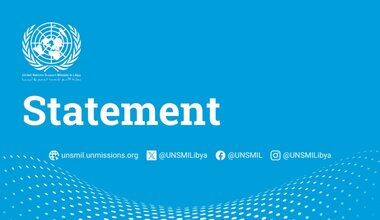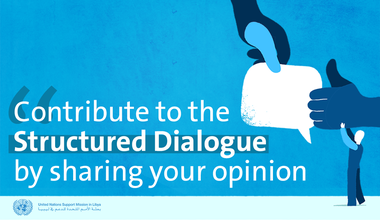Note to Correspondents: Chairperson’s Summary of High-Level Event on Libya at United Nations Headquarters, New York
New York, 20 September 2017
1. The Secretary-General of the United Nations, Mr. António Guterres, hosted a high-level event on Libya in New York, on 20 September 2017, at the level of Heads of State and Government. Participants included representatives of Algeria, Austria, Bahrain, Belgium, Bolivia, Brazil, Bulgaria, Canada, Central African Republic, China, Czech Republic, Croatia, Cyprus, Denmark, Egypt, Ethiopia, Finland, France, Gabon, Germany, Greece, Guinea, Indonesia, Iraq, Ireland, Italy, Japan, Jordan, Kazakhstan, Lebanon, Libya, Liechtenstein, Mali, Malta, Morocco, Norway, Oman, Portugal, Qatar, Republic of Congo, Russian Federation, Saudi Arabia, Senegal, Spain, Sudan, Sweden, Switzerland, The Netherlands, Tunisia, Turkey, United Arab Emirates, United Kingdom, the United States, Uruguay, the African Union, the European Union and the League of Arab States.
2. The Secretary-General commended the Libyan people for their perseverance in pursuing a path to greater freedom, amidst volatile circumstances in their country. He noted that there was a window of opportunity to resolve the Libyan crisis and called on all Member States to support the facilitation by the United Nations of an inclusive, Libyan-led and Libyan-owned political process. The Secretary-General outlined seven priorities for the United Nations in Libya: strengthening security arrangements and architecture; reinvigorating an inclusive political process, building on positive developments; building credibility with the Libyan people; coordinating international engagement, including efforts of Libya’s neighbours, as part of a common agenda; improving socio-economic conditions and provision of basic services; securing predictable humanitarian assistance; support migrants while upholding international norms. The Secretary-General expressed the commitment of the United Nations to build stability, security and national unity in Libya, as well as his personal engagement to mobilize international stakeholders for both the political process and economic recovery.
3. SRSG Salamé presented an action plan for the resumption of the Libyan political process under the facilitation and leadership of the United Nations. SRSG Salamé informed Member States that the Action Plan was shaped on the basis of extensive consultations with Libyans across the country. SRSG Salamé emphasised that the objective of the political process was to bring the Libyan transition to an end, towards the establishment of stable, predictable and effective governance. SRSG Salamé outlined a plan for an inclusive and sequential political process, where each stage justifies the next, within the framework of the Libyan Political Agreement, in a set timeframe. The first step of the political process consists of amending the Libyan Political Agreement (LPA) in an inclusive and consensual manner that addresses the main concerns that have hampered its implementation so far. SRSG Salamé emphasised that LPA remains the only viable framework to end the Libyan crisis, and that there was broad consensus amongst Libyans on the need to reach agreement on a limited set of amendments. In that regard, he announced his intention to convene representatives of the House of Representatives and of the High Council of State to swiftly start this process. The second stage of the political process consists of a National Conference under the auspices of the Secretary-General to bring together members of the LPA institutions and a wide range of stakeholders from across the spectrum of Libya’s society. Following the National Conference, the Constitutional Drafting Assembly will have the opportunity to review and refine its work, taking into consideration the observations and suggestions expressed during the National Conference. The House of Representatives and the Constitutional Drafting Assembly should work in parallel towards the adoption of the requisite constitutional and electoral framework for the holding of parliamentary and presidential elections within a year of the high-level event.
4. SRSG Salamé also highlighted the United Nations readiness to facilitate a security dialogue with armed groups, with a view to including them in the political process. SRSG Salamé further noted that the United Nations stood ready to support the process of reunification of the army, under civilian oversight and to support the High National Electoral Commission to prepare for the electoral process.
5. The process also aims to give the people of Libya a voice in their country’s future through various channels of dialogue, as well as through the adoption of a constitution by referendum. The culmination of these various steps is the establishment of a well-defined political, security and electoral framework within a year of the high-level event, and the subsequent holding of free and fair elections.
6. SRSG Salamé reaffirmed the commitment of the entire United Nations family to work for Libya, including humanitarian and development agencies, to intensify its work on the ground to help improve the living conditions of the Libyan people, which continue to deteriorate, as well as provide assistance to vulnerable populations including migrants. In that regard, he noted plans by the United Nations to continue ramping up its presence in Libya and called for a new round of funding for the United Nations stabilization facility for Libya.
7. SRSG Salamé called on all Libyans to come together in a spirit of compromise and to engage constructively in an inclusive political process to secure an end to the transition period. He also stressed the importance of local reconciliation efforts and the need to address the issue of internally displaced persons, including through a dedicated financing mechanism. SRSG Salamé encouraged the High National Election Commission to prepare for electoral events.
8. SRSG Salamé called on members of the international community to unite the various diplomatic initiatives in support of the facilitation of the United Nations of a single political process.
9. H.E. Mr. Faiez Mustafa Serraj, Prime Minister and President of the Presidency Council of the Government of National Accord of Libya gave an update on recent political and security developments, as well as on the humanitarian situation in Libya and the challenges facing the country, which is standing at a juncture. Prime Minister Serraj called for a political process that will lead to elections and the adoption of the constitution by referendum. He also stressed the importance of unifying all initiatives and channeling them under the lead of the United Nations. Prime Minister Serraj also noted that those dealing with parallel institutions are in violation of Security Council resolutions and should be held accountable.
10. Participants strongly supported the Action Plan for Libya under the leadership of the Special Representative and his on-going efforts to consolidate the various diplomatic initiatives. They called on all national, regional and international stakeholders to unite behind the United Nations facilitation of the political process. Participants emphasized that the window of opportunity must be seized now to bring new momentum in finding an inclusive solution, including through the participation of women and youth, that is Libyan-led and UN-facilitated. They expressed support for a unified and stable Libya, which was the shared common goal of the international community and its partners. They also stressed the need to put an end to parallel institutions, which may have a negative impact on the progress of the political process. Participants also emphasized the need to fully respect relevant Security Council resolutions.
11. Participants expressed concern over the deteriorating political, security, socio-economic and humanitarian situation in Libya, as well as the threat of terrorism, violent extremism and human trafficking. They underscored the risk these challenges pose to Libya’s stability and national unity, as well as to regional and international peace and security.
12. Participants reaffirmed the international community’s firm commitment to uphold Libya’s sovereignty and territorial integrity. They stressed the importance of reconciliation and building consensus among key political actors. Participants called on all Libyan actors to fully engage in the political process, stressing that there is no military solution to the crisis Participants underscored the need for all international actors to work together in a coordinated and united approach in support of the facilitation of the United Nations and within the framework of the LPA, with limited amendments, whose implementation remains key to holding elections and ending the transition. Participants also expressed concern over the security situation and the threat of terrorism that continues to loom across the country despite progress made over the last year. In that regard, they reiterated the need for unified, inclusive and strengthened national security forces, under civilian oversight.
Participants emphasised the need for economic recovery and scaling up stabilization and reconstruction efforts. They expressed support for and called on Libya’s financial institutions to work constructively towards alleviating the suffering of the Libyan people including through the improvement of the provision of basic services. Participants noted that international efforts should contribute to a sustained improvement of the human rights situation and called for greater adherence to international humanitarian law.
 United Nations Peacekeeping
United Nations Peacekeeping UN
UN









